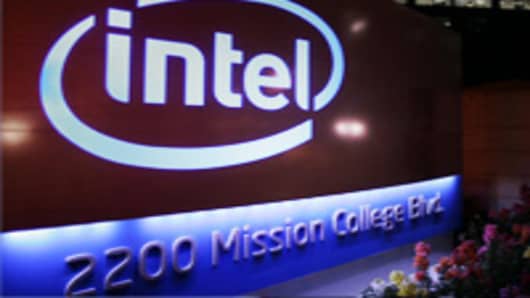Intel reported quarterly earnings that beat analysts' expectations and the chip maker said it was sharply increasing capital expenditures in an apparent bid to speed up its entry into tablets and smartphones.
"We had growth across every line of business" including personal computers, data centers, security, communications and phones, Chief Financial Officer Stacy Smith told CNBC after the earnings report.
Shares of thechip giant rose in after-hours trading. (Click here for the latest after-hours quote.)
Earnings excluding items rose to 69 cents per share, up from 59 cents a share in the year-earlier period.
Net income rose 6 percent to $3.4 billion.
Revenue jumped 21 percent to $13.9 billion from $11.46 billion a year ago.
Analysts had expected the company to report earnings excluding items of 61 cents per share on revenue of $13.72 billion, according to Thompson Reuters.
Smith said one of the biggest growth drivers in the quarter was from emerging markets. With prices coming down, more people could afford to buy a computer with Intel inside, he said. In China, for instance, a computer once cost someone 175 weeks of income; it is now down to eight weeks.
However, Smith expects sluggish sales to continue in mature consumer markets, particularly in Europe.
The company forecast quarterly revenue in line with Wall Street's expectations as a shortage of hard drives disrupts PC production in a market already hurt by a shaky economy and a growing preference for tablets.
Intel warned last month the damage wrought by flooding in Thailand — the world's largest producer of computer drives — would curtail December-quarter earnings.
Intel had a gross margin of 64 percent in the fourth quarter, with a non-GAAP gross margin of 65 percent. Analysts on average expected 64.6 percent.
Rushing to speed up its development of competitive chips for smartphones and tablets, Intel said it would boost capital expenditures in 2012 to $12.5 billion, plus or minus $400 million. Last year its capital expenditures were $10.7 billion.
"The biggest surprise is the capital expenditures for the new year," said Evercore Partners analyst Patrick Wang. "They're investing to catch up and not only be at parity but exceed where the handset incumbents are."
Lenovo and Motorola Mobility
After flooding in Thailand ruined factories and sensitive machinery, shortages of the components are expected to persist through the first half of 2012 and disrupt PC production, but Smith told CNBC inventories would recover in the second quarter.
Intel said revenue in the current quarter would be $12.8 billion, plus or minus $500 million. Analysts on average had expected current-quarter revenue of $12.770 billion, according to Thomson Reuters.
Hoping to safeguard its position in PCs, Intel this year will kick off its largest marketing campaign since 2003, with "Ultrabooks" — instant-on super-thin laptops it hopes can stand up to the likes of Apple's
Fears of falling PC sales hurt the shares of Microsoft , Dell and Intel for much of 2011. Intel's stock has recovered over the past three months, partly due to the chip maker's relatively high 3.3 percent dividend yield.
Still trading at a modest 10.8 times expected earnings, the shares recently hit a 52-week high.
Reuters contributed to this report.


